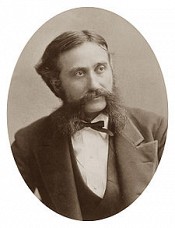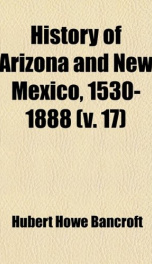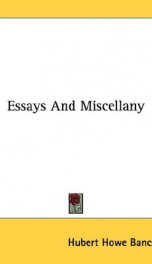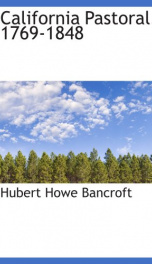Bancroft Hubert Howe

Hubert Howe Bancroft (May 5, 1832(1832-05-05) – March 2, 1918), an American historian and ethnologist, was born in Granville, Ohio. He attended the Granville Academy until he was sixteen, and he then became a clerk in a bookstore in Buffalo, New York. Relocating to San Francisco, California, he managed a bookstore there from March 1852 to 1868, and he began his own publishing house. He also accumulated a great library of historical material, and eventually he gave up business to devote himself entirely to writing and publishing history. Bancroft is interred in the Cypress Lawn Memorial Park in Colma, California. The Bancroft Library at UC Berkeley is named in his honor, and was founded when Bancroft donated his book collection to the University of California in 1905. Bancroft published a well-known group of local histories. Having formed a large collection of materials on the history of the Pacific coast, he then employed research and writing assistants to organize and produce statements of facts for large sections of a proposed general history. Originally he seems to have intended to use these statements of facts as the basis of a narrative which he himself would write; but as the work progressed he came to use the statements as they stood, with only slight changes. He said his assistants were capable investigators, and there is independent evidence to show that some of them deserved his confidence. (Frances Fuller Victor, in particular, was a highly regarded writer in her own right.) However, his failure to acknowledge each contribution created doubt concerning the value of any particular section. Overall, although Bancroft considered himself the author of the work, it is more accurate to consider him an editor and compiler. Neither Bancroft, nor most of his assistants, had preparatory training sufficient to save them from pitfalls common to historical works of this period. Their writing reflected personal opinions and enthusiasms, and their often-good books consequently have some serious defects. However, they were generally very well-received in their time. Historian Francis Parkman gave The Native Races high credit in The North American Review. Lewis H. Morgan, however, was more critical. Based on his newly-published theory of Indian culture, in an article called Montezuma's Dinner, Morgan completely reversed Parkman's verdict and raised doubt in the minds of the public about this and other volumes of the series. Bancroft's response to Morgan's criticism suggests that he did not understand Morgan's theory, which now is generally accepted by scholars. In chronicling the October 18, 1871 massacre of 19 Chinese people in Los Angeles Bancroft commented that the lynchings were a "right of revolution," and a democratic expression of the majority's "right . . . to suspend the action of the law . . . whenever they deem it essential to the well being of society to do so," rather than a lack of "due deference" or "disrespect for the law." Several schools are named for Bancroft, including Bancroft Middle School in Long Beach, California. In 1885 Bancroft purchased a ranch with an adobe home on it located in Spring Valley, in San Diego County, as a retirement home. It now is a National Historic Landmark.
do you like this author?
What readers are saying
What do you think? Write your own comment on this book!
write a commentWhat readers are saying
What do you think? Write your own comment on this author!
write a commentBook list

history of arizona and new mexico 1530 1888
Series:
Unknown
Year:
Unknown
Raiting:
4.5/5
Purchase of this book includes free trial access to www.million-books.com where you can read more than a million books for free. This is an OCR edition with typos. Excerpt from book: CORONADO'S EXPEDITION. 37 Compostela, whither went Viceroy Mendoza to deliver a parting address of encouragement; and in April the general with an advance party set out from San Miguel de Culiacan. Before leaving the north for Mexico, Coronado had despatched Diaz and Zaldivar, with fifteen men, to verify as far as possible Niza's reports. This party started in November 1539, and perhaps reached the Gila valley, but on account of the excessive cold decided not to attempt a crossing of the country beyond. From the natives they obtained information about Cfbola and the other provinces, similar to that given by the friar, but considerably less attractive and highly colored; and they also learned that the Cibolans had requested the south-western tribes not to permit the Christians to pass, but to kill them. This report was brought south by Zaldivar and three men, who met Coronado at Chametla; and while the news was kept secret, it was generally understood to be bad, and Fray Marcos had to exert his eloquence to the utmost to prevent discouragement.19 I append a note on the bibliography of Coronado's expedition.17 As I have said, the general left San "Mendoza's letter to the king, of April 17, 1540, with quotations from Diaz' report. Paclieco, Doc., ii. 356-62; CattaKtila, Ret., 29-30. 17 The most complete narrative is that of Pedro Castafleda de Nagera, knowu to the world only through the French translation, (.'antnneiln, Hehitioii du Voyai/e de Ciljoloj in Ternnur-Coiujxins, Voy., serie i. torn. ix. 24(5 p., with an appendix of various doc. pertaining to the subject. The author accompanied the expedition in a capacity not stated; wrote about 20 years after the occurrence of the events described, and ace. to M. Ternaux was a resident of C'uliacan. He was a man of ability...
Show more
add to favoritesadd In favorites

chronicles of the builders of the commonwealth historical character study
Series:
Unknown
Year:
Unknown
Raiting:
4/5
Show more
add to favoritesadd In favorites

catalogue of valuable books duplicates from the library of mr hubert howe banc
Series:
Unknown
Year:
Unknown
Raiting:
3.5/5
Show more
add to favoritesadd In favorites

bancrofts history of the pacific coast alaska and california a review
Series:
Unknown
Year:
Unknown
Raiting:
5/5
Show more
add to favoritesadd In favorites
What readers are saying
What do you think? Write your own comment on this author!
write a commentif you like Bancroft Hubert Howe try:
readers also enjoyed
What readers are saying
What do you think? Write your own comment on this author!
write a commentGenre
if you like Bancroft Hubert Howe try:
readers also enjoyed
Do you want to exchange books? It’s EASY!
Get registered and find other users who want to give their favourite books to good hands!



